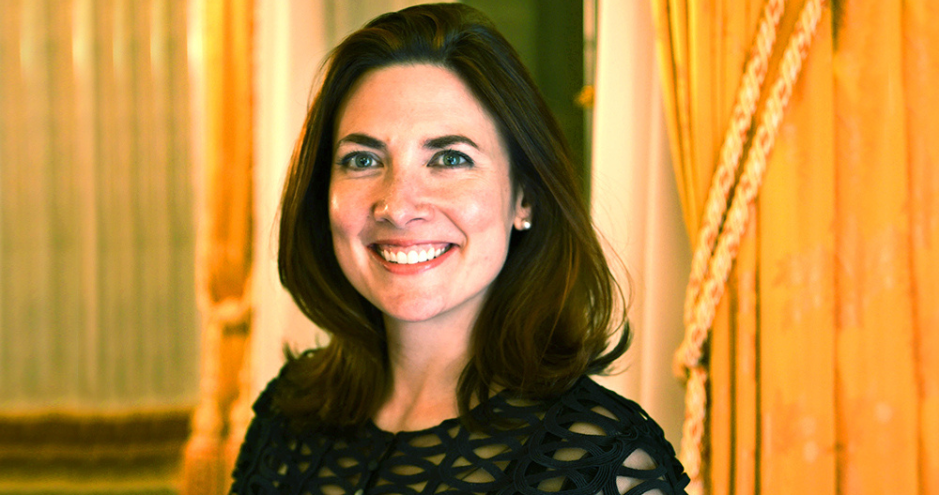Guest Post: A Librarian Gets an Executive MBA
In this guest submission, Audrey Chapuis, Director of the American Library in Paris, writes about how an Executive MBA from HEC Paris is equipping her with the tools to lead her institution into an increasingly complex future.

Imagine, for a moment, a library.
Silent reading rooms, rows of leather-bound books, and perhaps a bespectacled librarian may come to mind. Images redolent of nostalgia and perhaps personal meaning if you’ve spent time in libraries studying or researching. For many, libraries represent places of poignancy, even if they haven’t stepped foot in one recently. A substantial majority of Americans hold library cards and surveys show that libraries are one of the few trusted public services, along with the military. What a library is and how it serves the public has radically changed over the past few decades. Just as business is transforming with the digital revolution, so are libraries. Agility, an understanding of technology, and a focus on the end-user are now critical to basic operations. Decisions must be data-driven, and services must keep up with the changing information landscape and the public’s information appetites.
Rather than mere book depositories, libraries have become vibrant community centers.
In the midst of these changes, every assumption must be questioned and nothing can be taken for granted. For example, trends in public library use show that the circulation of print books is going down, but program attendance is skyrocketing. Rather than mere book depositories, libraries have become vibrant community centers.
Reflections on learning
I’ve been thinking about libraries and what they mean to people for twenty years since I got my first library job shelving books. Never in my wildest dreams would I have imagined that I would be pursuing an Executive MBA at HEC back in those days. I didn’t know how deeply relevant the EBMA courses would be to my work as a librarian. In those days, business environment and strategy seemed like a world away from the work of libraries and literature. But in my current role as the Director of the American Library in Paris I have found that business acumen is crucial to the successful operation of my organization, which is the largest English-language library on the European continent and a one-hundred-year-old cultural nonprofit. Leading a team that serves an international public requires more than a love of books--though most librarians do have that in spades. It demands long term strategic thinking, an understanding of organizational behavior, and insight into trends in digital transformation. Libraries are complex institutions in an increasingly complex world, and information professionals need new tools for assessing our offerings, especially in a global marketplace.
Positive impact on a global scale
There can be some reluctance in the nonprofit sector to adopt tools and terminology from the business world. We’re resistant to thinking about profits and the bottom line, for example, when our mission is educational, social, or cultural. When I was investigating EMBA programs, I looked for those that had a holistic approach. The mindset that HEC cultivates is precisely for a larger social good. It is light-years beyond “business for business’s sake”--the focus, instead, is on the myriad intertwining factors that create value and progress from a truly humanist perspective. From the start of the program, there was an evident mission to create leaders who will make a positive impact on a global scale, starting from the ground up. It was a perspective that is wholly in line with the purpose and mission of libraries and nonprofit organizations, which will have more and more opportunities to partner with social enterprises and socially conscious for-profit organizations. The more those of us in the nonprofit, cultural, or academic sectors understand about the business world, the better partners we can be across sectors and the more value we bring our public and to the world.
No organization exists in isolation; they are human-driven and community-anchored.
Indeed, no organization exists in isolation; they are human-driven and community-anchored. Adaptation and change are imperatives to any thriving institution. Library professionals too have adopted a growth mindset in the twenty-first century. The COVID crisis too was a stark test for information professionals to adapt our services and resources to radically altered circumstances. At the American Library in Paris, we went through several iterations at a pace that would have been unthinkable for an earlier generation. Hundreds of cultural programs went virtual. Our community stayed tethered to us through technology. And we launched a click-and-collect service for books using basic tools like Calendly almost overnight. Book groups met via Zoom; authors met their fans in breakout rooms, and the vibrant life of the library continued through the crisis in new ways.
Booking a place in the future
As in every sector, library professionals are now looking ahead toward an altered future. We need every tool at our disposal to understand our users’ needs. In our class on Business Strategy, we talked about understanding customers not merely by asking them what they think of an offer or product, but rather “deep interviewing” them to find out their most basic human needs. Libraries--and nonprofits and cultural organizations--have wide opportunities for reinvention now. Through strategic investigation and assessment of our changing environment, leaders in those fields can offer new services and platforms for discovery. We can stay loyal to our educational and social missions through understanding our users and communities and adapting to meet their needs.
Our reading rooms are still hallowed. Our rows are still filled with books, and a team of librarians--bespectacled or not--is ready to help. And now, in addition, we are ready to meet you via Zoom, to introduce our digital databases, and to listen to your information needs. Imagine a library. It’s a world of possibilities.
This essay has been edited for clarity and style.